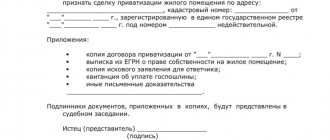An individual's housing rights are implemented by law through the privatization of his place of residence. If these rights are violated, privatization is subject to challenge. And it is in this case that the limitation period is mentioned. The Civil Code of the Russian Federation defines this concept as the time during which the violated rights of an individual are subject to protection.
In cases involving the privatization of housing, the concept of limitation of actions has several specific features. Even before submitting a statement of claim to the office of the court, the reason and the period of time during which a challenge is allowed must be established. This article is devoted specifically to the use of the statute of limitations and its possible restoration if omitted.
When is it considered illegal?
Most often, privatization is considered illegal if there is no refusal of privatization from persons over fourteen years of age.
To privatize housing it is necessary (Article 2 of the Law “On the Privatization of Housing Stock in the Russian Federation”):
- consent of all adult family members living together;
- as well as the consent of minors aged 14 to 18 years, since they participate in privatization automatically with the consent of their legal representatives or guardians.
In case of refusal, a family member must formalize it and have it certified by a notary; only in this case can the apartment be legally privatized. It also happens that one family member does not participate in privatization, but does not formalize the refusal, and the rest of the family members formalize privatization, bypassing the interests of the person who refused. In this case, privatization may subsequently be declared illegal in court.
- Re-privatization.
Based on current laws, a Russian citizen can participate in the privatization of housing only once (Article 11 of the Law “On the privatization of housing stock in the Russian Federation”). If a person participated in privatization a second time, then such privatization will be considered illegal in the future. The exception is children who have not reached the age of eighteen and have already taken part in privatization. They will be able to re-privatize housing only once upon reaching adulthood. - If persons temporarily deregistered from the apartment were illegally deprived of the right to privatization. This happens when one of the family members is temporarily absent for some reason and is removed from the register. In this case, such privatization should be declared illegal.
- If a person registered in the apartment and who is a citizen of the Russian Federation, who has not previously taken part in privatization, was deliberately not included in the privatization agreement (including minors).
- If a person participated in privatization who did not have any legal rights or grounds for this.
- If false documents were used during privatization or some of the documents lost their legal force.
- If a person took part in privatization under duress, or was previously misled, was in an incapacitated state, etc.
IMPORTANT! The opportunity to privatize is given to a citizen of the Russian Federation only once in his life, so if he was previously able to take advantage of these privileges, then the second time the authorized bodies will be forced to refuse him.
We talk about in what cases a refusal of privatization can be obtained and whether it can be challenged in a separate article.
Privatization of property
Ownership of real estate can arise in several ways, including after the privatization of a municipal property. The transfer of property from a state fund to private ownership is carried out through a special legal procedure.
After privatization is completed and the rights to the property are secured, the new owner is endowed with an extensive list of rights. He can dispose of the received object at his own discretion:
- Rent it out.
- Give.
- Exchange.
- Sell.
- Bequeath.
- Make it the subject of collateral.
The privatization procedure can be carried out in relation to:
- Residential real estate.
- Land plots.
Each case has its own conditions and nuances that should be taken into account.
Residential premises
Citizens who live in municipal property legally can privatize residential premises. Those people who have documented their need for housing and did not have the opportunity to purchase real estate in any other way can obtain the right to live in a social apartment. When housing is provided to those in need, a social tenancy agreement is concluded with them, which in fact is the justification for their legal residence in the premises. Those moving into a municipal apartment also undergo a registration procedure, which allows them to subsequently participate in privatization.
Residential premises can be privatized under the following conditions:
- Voluntarily.
- For free.
In addition, there is another important criterion - you can become a participant in the procedure only once.
Is it possible to cancel the procedure?
There are 3 cases when you can legally cancel the privatization of an apartment.
How to cancel a decision by mutual consent of the parties?
In order to voluntarily cancel privatization, it is enough to write an application to the local government stating that you want to deprivatize the apartment (read how and in what cases deprivatization and deprivatization of housing is possible here). If the apartment has several owners, then the application must be from each. The downside is that the right to free privatization of housing can only be used once, which means you will not be able to privatize housing again, since your right will be considered used.
The exception is cases when a minor participated in privatization, then he retains the right to free privatization, even if he is already an adult.
Invalidation of a transaction through court
If you believe that during the privatization of an apartment your rights were violated, for example, your signature on the refusal to privatize was forged, you can challenge the deal in court. The grounds for declaring a transaction invalid are: the conclusion of a transaction under the influence of delusion or deception or a threat, or due to a state of health when the person did not understand the significance of his actions and could not manage them. As a result, if the privatization is declared invalid, you will be able to use the right to free privatization again.
Partial cancellation
Occurs in the event of incorrect distribution of shares of the residential premises. The court decides to cancel privatization with subsequent re-privatization, but with the correct shares. You can find more information about the nuances of privatization of a share of housing here.
Legal consequences
Immediately after the statute of limitations is restored by the court, consideration of the main case begins to challenge the results of privatization, their adjustment or cancellation.
Legal consequences of privatization carried out with violations:
- the violator voluntarily refuses privatization;
- officials (employees of the mayor's office, Rosreestr, BTI, Housing Department) are held administratively liable;
- unaccounted rights are restored;
- for the fact that the rights of the plaintiff were violated, the court awards material compensation;
- privatization is canceled and the property is returned to the balance sheet of the municipality.
If you notice that the re-registration of municipal housing was carried out with violations, know that privatization can always be challenged or canceled completely. To do this, you must have time to submit a statement of claim and documentary evidence to the office of the district court within three years. If the deadlines were missed, you should not waive your legal rights; if there are good reasons, the deadlines can always be extended.
- Due to constant changes in legislation, regulations and judicial practice, sometimes we do not have time to update the information on the site
- In 90% of cases, your legal problem is individual, so independent protection of rights and basic options for resolving the situation may often not be suitable and will only lead to a more complicated process!
In what cases does a contract become invalid?
The basis for declaring privatization invalid may be the conclusion of an agreement under the influence of delusion, threat, deception, state of health, in cases where a person does not understand his actions and cannot manage them.
Important! In accordance with the law (in particular, Article 167 of the Civil Code of the Russian Federation), an invalid transaction does not entail legal consequences and each party is obliged to return everything received during the transaction.
When privatization is declared invalid, all subsequent transactions with this property are also declared invalid.
How to challenge and where to go to sue real estate?
According to the law “On the privatization of state and municipal property”, you can challenge the transaction by declaring it invalid on the following grounds:
- establishing the fact of illegal acquisition of housing;
- execution of a transaction by unauthorized persons.
If an illegal privatization of an apartment (house) has been formalized, it is important to know how to challenge it. First, you need to submit a complete package of documents to the court along with the statement of claim. The court will begin proceedings in the case based on correctly executed documents. After the completion of the trial regarding the apartment transaction, submit documents to the state register.
To begin proceedings in court, it is necessary to collect a package of documents and ensure that the statute of limitations is not violated.
Required documents:
- Statement of claim.
- Certificate of ownership of the apartment.
- Receipt for payment of state duty.
- Evidence of an invalid agreement.
It is necessary to draw up as many claims as there will be defendants in court.
Typically, the process of challenging privatization in court takes no more than six months.
Other publications by our experts may also be useful to you:
- What documents will be needed and how is privatization completed?
- Rules for registering ownership of municipal housing.
- Who can participate in free privatization, and how does it happen and how much does paid privatization cost?
Price issue
The cost of the procedure varies by region and depending on whether the applicant will handle the proceedings themselves or appoint a qualified lawyer to do so.
The scope of work and their cost are as follows:
- consultation, legal advice - from 1,500 to 3,000 rubles.
- collection of documents - from 3,000 to 5,000 rubles.
- drawing up a statement of claim – from 5,000 to 9,000 rubles.
- writing claims, requests, demands - from 3,000 to 5,000 rubles.
- representation of interests in the court of first instance – from 5,000 to 12,000 rubles.
- drawing up petitions, requests related to the conduct of the case - from 3,000 to 5,000 rubles.
- familiarization with the case materials – from 3,000 rubles.
- execution of other instructions of the principal - as a rule, from two to 5,000 thousand rubles, depending on the circumstances.
- work in the appellate court - double pay.
Attention! If the initiator of the dispute independently collects the necessary information to submit an application, the cost will decrease slightly. Sometimes the plaintiff is a legally literate person and draws up a statement of claim himself and participates in court hearings. In this case, the price of the issue may well be reduced to the amount of the state duty paid.
How to refuse privatized housing?
Currently, any citizen can voluntarily refuse privatized housing if there are no obstacles.
You should start the process by submitting an application to your local authorities. All owners must personally declare their intention to transfer housing to the state.
The application is considered by the authorities within 30 calendar days.
Based on the results of the consideration, a resolution is issued and within two months the administration concludes an agreement on the transfer of the apartment to the state and concludes a social rental agreement with the residents. Currently, the refusal process can be carried out through the MFC services created under each administration of cities and towns.
The following documents must be attached to the application:
- Copies of the personal document (or documents) of the owner.
- Original Certificates of Ownership.
- Certificate of no restrictions issued by Rosreestr.
- Extract from the house register. It must include all records from the moment you moved into the apartment.
- A technical passport with an explanation and a housing plan, issued by the BTI.
- Document confirming payment of state duty.
IMPORTANT! If privatization was declared illegal and cancelled, all transactions related to this housing are canceled, as well as the right to privatize housing in the future for participants in illegal privatization.
Limitation periods
The calculation of the period begins from the time when the interested person became aware of the violation of his rights. The new edition of the Civil Code of the Russian Federation dated September 1, 2013, in Article 181, establishes the limitation period for applying the consequences of invalidity of a transaction at three years.
At the same time, the statute of limitations for the privatization of an apartment for a person who is not a party to the transaction should not exceed 10 years from the beginning of its execution.
If the opposing party does not file a motion to skip the limitation period, the contract can be terminated without taking into account the limitation period. In exceptional cases, the court may recognize the reason for missing the deadline as valid and consider the case after three years.
Judicial practice for minors
A significant part of real court cases is occupied by proceedings on claims of citizens who were minors at the time of privatization.
The transaction is asked to be canceled when:
- a minor signed a waiver of privatization at the instruction of his parents, not realizing that he was giving up property - they cite a misconception;
- the child was simply not included in the privatization, he was registered in the apartment, but was not included in the social tenancy agreement by the employer - a reference to a violation of the law under Part 2 of Art. 168 Civil Code of the Russian Federation.
There is an opinion that the statute of limitations for minors is calculated from the moment they reach 18 years of age. This is a gross mistake - there is confusion with the legislation on alimony.
The period of claim for minors is calculated from the moment when the child learned or should have learned about privatization. A striking example is a 16-year-old teenager who signed a waiver. The court recognizes that such a teenager could clearly and in detail understand the consequences of his refusal, which means that the limitation period for him began from the date of completion of the privatization of the apartment (for example, the Determination of the Penza Regional Court of October 9, 2012, case No. 33-2397).
If a citizen learns that his rights were violated as a child, the claim period for protection should be tied precisely to the moment of receiving the information, and not to the date of majority. This position is also shared by the Supreme Court of the Russian Federation (see, for example, Review of the judicial practice of the Supreme Court of the Russian Federation for the third quarter of 2008, dated December 5, 2008).
For example, if a child did not write a refusal, he could find out about privatization many years later, having received this living space as an inheritance from a deceased parent. The limitation period will begin from the moment of issuance of the inheritance certificate (but not more than 10 years from the date of privatization) - as mentioned by the Supreme Court in the Review presented above.
The problem with this approach is serious. Children, even older teenagers, find it difficult to adequately assess that their rights are being violated. Parents can abuse this position by excluding their children from participating in the privatization of the apartment. Despite this, judicial practice follows the path indicated above.











